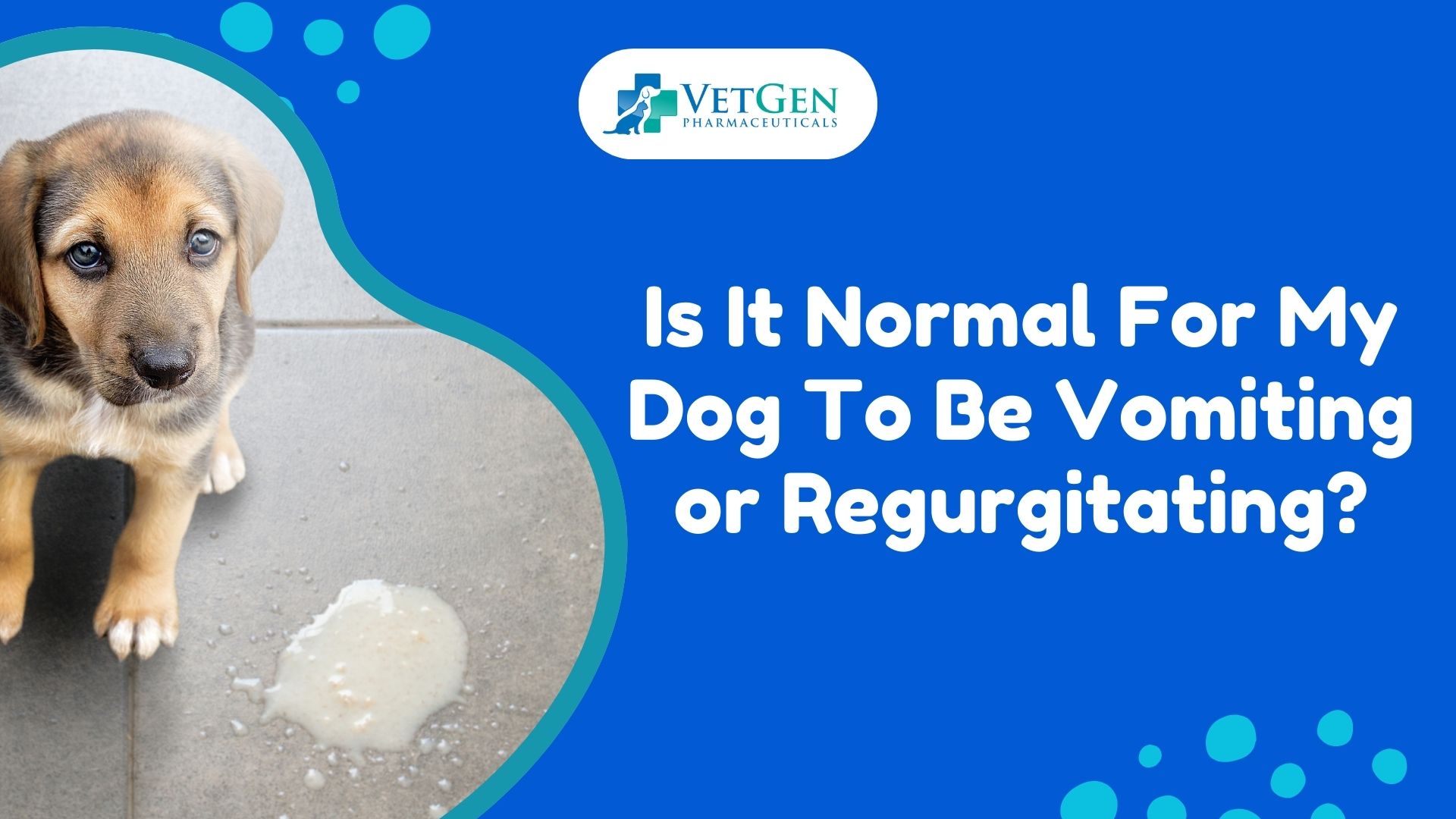Vomiting is one of the most common reasons that people take their dogs to the vet. In that respect, you could consider vomiting or regurgitating to be “normal” for a dog.
But not all vomiting or regurgitating is normal, and your dog may need to see a vet sooner rather than later.
Let’s discuss the difference between vomiting and regurgitating, causes of each, when you should worry, and when you probably don’t need to be concerned.
What’s the Difference Between Vomiting and Regurgitating?
Vomiting is a very active process, where the dog is forcefully ejecting the contents of their stomach or intestines.
It’s often preceded by a sound that will cause you to leap out of bed in the middle of the night.
Food is usually at least partially digested, or it may be only yellowish bile that comes up.
Regurgitation is more passive and usually happens while a dog is eating or shortly afterward.
There is no scary noise beforehand, and sometimes it looks like food or water just falls right out of your dog’s mouth – often with your dog looking as surprised as you when it happens!
Regurgitation is usually either just water or undigested food.
Vomiting and regurgitation indicate very different potential health issues for your dog, so it’s important for you to be able to recognize the difference so you can tell the vet.
When Not to Worry About Your Dog Vomiting or Regurgitating
Every dog vomits or regurgitates from time to time.
If your dog just throws up once and goes on with their life as if nothing happened, there is generally nothing to worry about.
As long as your dog isn’t vomiting or regurgitating more than once a week, your dog is probably fine and just has an upset stomach.
Causes of Acute Dog Vomiting or Regurgitating
Acute vomiting is a sudden case of vomiting or regurgitating rather than a continuous problem.
A variety of health issues can cause acute dog vomiting or regurgitation, some of which may be severe.
A few causes of vomiting or regurgitating include:
- Diet change
- Bloat (a condition where the stomach fills with air and cuts off blood flow to the intestines)
- Poisons, toxins, or irritating substances
- Kidney failure
- Liver failure
- Pancreatitis
- Medication reaction
- Viral infection
- Bacterial infection
- Heat stroke
- Intestinal parasites
- Motion sickness
Causes of Chronic Dog Vomiting or Regurgitating
Chronic vomiting or regurgitation refers to frequent or long-term problems with vomiting or regurgitation and may indicate a serious health problem.
Some causes of chronic vomiting may include:
- Cancer
- Pancreatitis
- Intestinal obstruction
- Intestinal inflammation
- Uterine infection
- Parvovirus
- Colitis
- Liver or kidney problems
- Systemic illness
- Constipation
- Megaesophagus (ME)
You should always talk to your vet about chronic dog vomiting or regurgitation.
Take your dog to the vet even sooner if chronic vomiting is accompanied by any of these additional symptoms:
- Abdominal pain
- Depression
- Blood in the vomit or stool
- Dehydration
- Fever
- Poor appetite
- Weakness
- Weight loss
- Unusual change in behavior
What if my Puppy is Vomiting or Regurgitating?
Puppies lose the immunity that they had received from their mother at birth by the time they are around 6 weeks old, but they don’t get all of their vaccinations until they are around 6 months old.
As a result, vomiting in a puppy could indicate a very serious health problem.
Vomiting can also cause puppies to become dehydrated faster than adult dogs, so you should always call your vet any time your puppy vomits or regurgitates.
When to Worry About your Dog Vomiting or Regurgitating
While occasional vomiting is not something you need to worry about, there are times when vomiting or regurgitation can indicate a serious problem.
Call your vet right away if your dog experiences any of the following:
- Chronic or recurring vomiting or regurgitation
- Continuous vomiting
- You think your dog swallowed something they shouldn’t have
- Seizures
- Vomiting a lot all at once
- Vomiting with nothing coming up
- Vomiting blood
- Bloody diarrhea
- Vomiting with other symptoms, like lethargy, weight loss, fever, or behavioral changes
When Should I Call the Vet about My Dog Vomiting or Regurgitating?
While it’s never a bad idea to call your dog’s vet after they vomit or regurgitate, here are some of the types of situations where waiting too long to call the vet could cost your dog their life:
- Your dog is a puppy less than 6 months old
- You think your dog swallowed something they shouldn’t have
- They also have diarrhea
- There is blood in their vomit or stool
- Your dog is experiencing behavior changes (like lethargy)
- They are vomiting or regurgitating more than once a week
- There are any additional symptoms
What Should I do if my Dog is Vomiting or Regurgitating?
If your dog vomits once and doesn’t meet any of the criteria for an emergency call or trip to the vet, your dog will probably benefit from giving their stomach a day of rest.
You probably don’t eat right away after vomiting, right?
The first thing you should do is to avoid giving your dog any food or treats for 12 to 24 hours.
Your dog should still always have access to clean water to prevent dehydration.
If your dog does not experience any more vomiting or other symptoms after a day with no food, you can start them on a bland diet.
When you have an upset stomach, you probably start with something like crackers or dry toast to test your stomach first, right?
The equivalent for dogs is usually boiled chicken and rice.
This is a bland diet that shouldn’t irritate your dog’s stomach.
After a day or two of the bland diet, you can start reintroducing your dog’s normal food a little bit at a time.
Keep in mind that changing a dog’s diet too suddenly can cause stomach upset, so add the normal diet to the boiled chicken and rice slowly.
Final Thoughts
It can be scary to watch your dog vomit or regurgitate, but it’s often nothing to worry about. If you have any concerns, never be afraid to reach out to your vet to see what they recommend.






